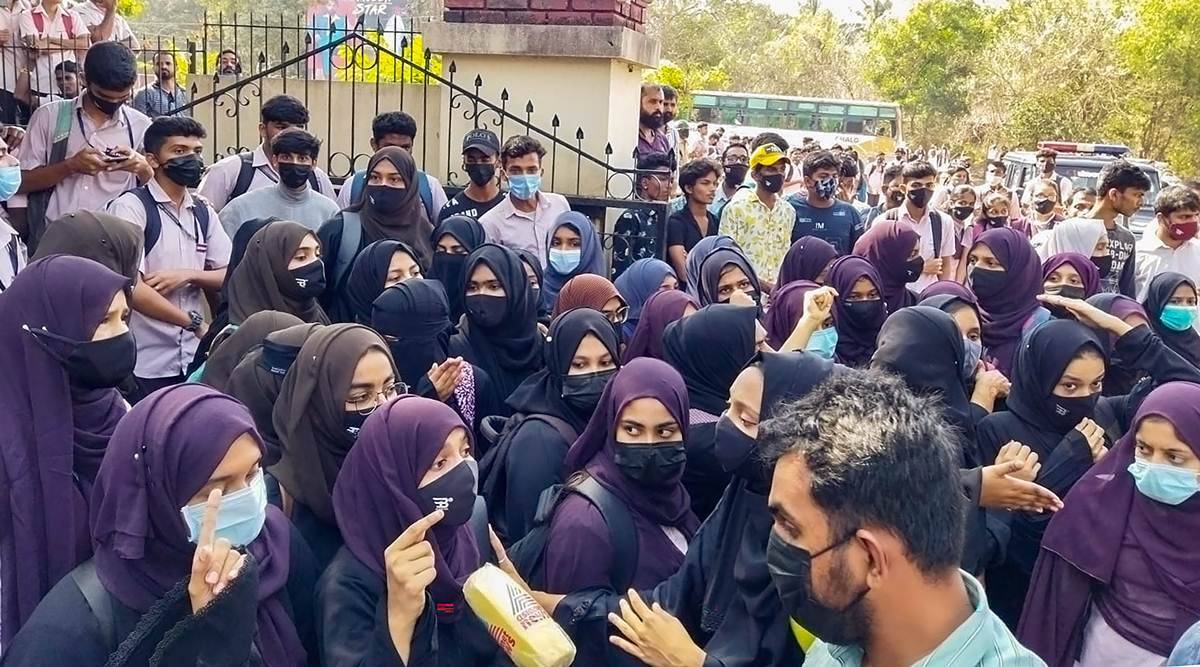 Students protest against the hijab ban in Karnataka (file photo)
Students protest against the hijab ban in Karnataka (file photo) A day after the Karnataka High Court upheld the ban on wearing of hijab in educational institutions in the state, the Supreme Court on Wednesday said it will consider listing an appeal challenging the order after the Holi recess.
“Others also mentioned. Let us see. We will list after vacation,” Chief Justice of India N V Ramana said as Senior Advocate Sanjay Hegde, who appeared for the appellants, sought urgent listing.
The court will be closed for Holi from Thursday, and will reopen on March 21.
Hegde asked if the court would consider listing it on March 21, saying the affected students have to sit for exams which are set to begin. “Mr Hegde, give us time. We will see. We will post the matter,” CJI Ramana replied.
On Tuesday, a full bench of the Karnataka High Court dismissed a batch of petitions filed by Muslim girls studying in pre-university colleges in Udupi seeking the right to wear hijabs in classrooms. The HC ruled that wearing the hijab “does not make up an essential religious practice in the Islamic faith” and freedom of religion under Article 25 of the Constitution is subject to reasonable restrictions.
The HC also upheld an order issued by the state government on February 5, which suggested that wearing hijab can be restricted in government colleges where uniforms are prescribed, and ruled that such curbs under norms for college uniforms are “constitutionally permissible”.
The HC also ruled that there was no case for initiating disciplinary action against government college authorities in Udupi for barring girls from attending classes with the hijab and sought a “speedy and effective” police probe into the alleged role of “unseen hands” that may have been “at work to engineer social unrest and disharmony” over the issue in the state.
In their appeal in the Supreme Court, two students, Niba Naaz and Manal, contended that the HC had “erred in creating a dichotomy of freedom of religion and freedom of conscience wherein the court has inferred that those who follow a religion cannot have the right to conscience”.
They said the HC had “failed to note that the Karnataka Education Act, 1983, and the Rules made thereunder, do not provide for any mandatory uniform to be worn by students” and that it does not empower the state government to prescribe a uniform for the students.
The plea contended that the HC “has failed to note that there does not exist any provision in law which prescribes any punishment for students for not wearing uniforms… Therefore, it is submitted that the action of the respondents in prohibiting the students from accessing classrooms is devoid of any legal basis”.
The HC had failed to note that the right to wear a hijab comes under the ambit of the right to privacy under Article 21 of the Constitution of India, they said, adding that the freedom of conscience forms a part of the right to privacy.
The right to wear a hijab is protected as a part of the right to conscience under Article 25 of the Constitution, which is essentially an individual right, they said, adding that the ‘Essential Religious Practices Test’ ought not to have been applied by the HC. “Assuming the ‘Essential Religious Practices Test’ does apply, the Hon’ble High Court has failed to note that wearing of hijab or headscarf is a practice that is essential to the practice of Islam,” they said.
- The Indian Express website has been rated GREEN for its credibility and trustworthiness by Newsguard, a global service that rates news sources for their journalistic standards.

